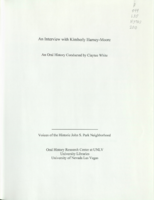Search the Special Collections and Archives Portal
Search Results

Patricia Lappin interview, February 26, 1980: transcript
Date
Archival Collection
Description
From the Ralph Roske Oral History Project on Early Las Vegas collection OH-01063. On February 26, 1980, Nancy Bright interviewed school teacher, Patricia Lappin (born April 14th, 1924 in Denver, Colorado) at Robert L. Taylor Elementary School in Henderson, Nevada. The interview covers Boulder City, Nevada around Hoover Dam. The two discuss the different gambling habits between Southern Nevada locals and Las Vegas tourists. During the latter half of the interview, the two speak at length about the impact of nuclear waste on Nevada. Lappin explains the unique issues that Southern Nevada faces as one of three states to accept nuclear waste.
Text

Transcript of interview with Phyllis Webb Clark by Lorna Suzette Clark, April 7, 1976
Date
Archival Collection
Description
On April 7, 1976, Lorna Suzette Clark interviewed her mother-in-law, Phyllis Webb Clark (born 1928 in Los Angeles, California) about her experiences from living in Las Vegas. The two first discuss education, the various address at which Phyllis lived, and the early development of the Strip and Downtown areas. The interview then covers the visits of important individuals, forms of transportation, the effect of World War II on the economy, and the effects of the growing town on hospitality and courteousness. Phyllis also mentions the Helldorado Parade, her involvement in Boy Scouts and Girl Scouts, and recreational activities. The interview concludes with a discussion on the atomic testing, the Stewart Ranch, and floods in Las Vegas.
Text

Transcript of interview with Clark Crocker by Monica Lehman, March 3, 1978
Date
Archival Collection
Description
On March 3, 1978, Monica Lehman interviewed Clark Crocker (born 1920 in Westfield, Massachusetts) about his experiences while living in Nevada. Crocker first talks about his family and educational background before describing his experiences from going to school in both California and Massachusetts. Crocker then describes what he knows about the building of Hoover Dam and later talks about his career as a teacher and school principal. The two also discuss Crocker’s hobbies and volunteer work, including that for the fire department in Pahrump, and they later discuss Crocker’s experiences as both a frogman and navigator for the United States Navy during World War II. The interview concludes with some of Crocker’s thoughts and philosophies on how curriculum should be structured in schools.
Text

Transcript of interview with Betty Ham Dokter by Roger Jablonski, February 27, 1977
Date
Archival Collection
Description
On February 27, 1977, Roger Jablonski interviewed Betty Ham Dokter (born 1922 in Las Vegas, Nevada) about her life in Southern Nevada. Dokter first talks about her upbringing and education in Las Vegas before describing church activity and the first casino properties that were built. She later talks about presidential visits, economic changes in Nevada, the construction of Hoover Dam, and some of the social changes in Las Vegas. The latter part of the interview covers the topics of racial minorities, environmental changes, early grocery stores and movie theaters, and social clubs. The interview concludes with a brief discussion on Mt. Charleston.
Text
Transcript of interview with Count Guido Roberto Deiro by David G. Schwartz, January 30, 2002
Date
Archival Collection
Description
Count Guido Roberto Deiro, born in Reno, Nevada, in 1938, has had several fascinating careers. The son of vaudeville performer and recording star Count Guido Pietro Deiro, who was the first major piano-accordionist to become popular in the United States, and his teenage wife Yvonne Teresa LeBaron De Forrest, Deiro grew up in and around Las Vegas and Southern California after his parents' 1941 divorce. After attending 13 grammar schools and five high schools, Deiro graduated from Las Vegas High School in 1955. During his youth, thanks to his stepfather Samuel "Baby Shoes" Prezant, Deiro had an early introduction to the Las Vegas gambling scene. Following a brief stint in the U.S. Army, Deiro worked a series of jobs, including parking cars, selling shoes, and driving an ambulance. He transitioned from working as a fitness instructor to being a lifeguard at the El Rancho Vegas hotel, all the while becoming interested in aviation. Deiro entered the gaming industry at the age of 19 and a half, when he began working as a dealer, having been taught by his stepfather. Breaking in at the Nevada Club, Deiro, who became known as "Bobby Blue Eyes," later worked at the New Frontier, Sands, El Cortez, and Holiday casinos. He provides a great deal of detail about the social world of Las Vegas casinos in the 1950s through the 1970s, with insight into many major personalities. While working in gaming, Deiro continued to pursue a career in aviation, acquiring in the early 1960s a commercial pilot license, instrument rating and instructor's certificate. He began working as a flight instructor and charter pilot at Thunderbird Field, now known as North Las Vegas Air Terminal. Deiro flew around the United States promoting Las Vegas and the airfield. After Howard Hughes purchased the airfield in 1967, Deiro stayed, ultimately becoming Director of Aviation Facilities for the Hughes Tool Company. Following his marriage to Joan Marlene Calhoun, Deiro moved to California, where he became Vice President and Director of Administration for Air California and Golden West Airlines, before serving with other companies owned by C. Arnholdt Smith. In 1971, Deiro returned to Las Vegas. Deiro then met artist Michael Heizer, who enlisted Deiro's help in scouting and securing locations for his Earth art installations. This led to Deiro's long involvement with that genre. In addition to these careers, Deiro was also influential in many key developments in Las Vegas, including the construction of the Las Vegas Motor Speedway and, with his wife Joan, several philanthropic endeavors. In this interview, Deiro shares his perspectives on his times and his impact on Las Vegas.
Text

Transcript of interview with Kimberly Harney-Moore by Claytee White, June 16, 2010
Date
Archival Collection
Description
Kimberly Harney-Moore and her three siblings were raised in the John S. Park Neighborhood in the 1960s and 1970s. Their parents, Tim and Kathleen Hamey, were educators. A nostalgic feeling for the neighborhood remains; perhaps, rekindled when she had close friends buy a house across the street from her childhood home. In this interview, Kimberly talks about the inviting character of the area's architecture, mentions a few names of neighbors she babysat for, and fondly recalls her job at Luv-Its Custard shop. There was a time when she would drive through the old neighborhood and be saddened by the lack of upkeep and the changes, but today it is a place being reborn to a new generation. Note: Tim Harney and Kathleen Harney, Kimberly parents, are also participants in the Voice of the Historic John S. Park Neighborhood oral history project.
Text

Transcript of interview with Patricia "Pat" Marchese and Lamar Marchese by Stefani Evans and Claytee White, February 7, 2017
Date
Archival Collection
Description
In this interview, the cultural power couple recall their early impressions of Las Vegas, their beloved Ninth Street house built by Marion Earl, and the changes that caused them to move when spot zoning destroyed their close-knit downtown neighborhood. Lamar speaks of the founding of public radio KNPR and KCNV, of finding studio space, of obtaining grant money to build on the campus of the (now) College of Southern Nevada, and of acquiring the Peter Shire sculpture that graces the front of the studio. He talks about the vision of Charles Hunsberger, of Hunsberger's fall, and of politically appointed boards of trustees. Pat shares her experience of meeting people in a babysitting co-op and the UNLV Art Department, getting her UNLV Master's degree in public administration, and her work in cultural programming with the City of Las Vegas and with Clark County. She speaks of creating gallery, classroom, and performing space at the City's Reed Whipple building and the Charleston Heights Art Center; of founding the Rainbow Company Youth Theatre; of developing Clark County's Desert Breeze Park, Flamingo Senior Center, and the Wetlands, among others; of placing exhibits of the Clark County Museum at McCarran International Airport; of the Public Arts Commission, the Airport Arts Commission, the Allied Arts Council, and of developing Community Development Block Grant programs for the City of Las Vegas and Clark County. Throughout the interview, Pat and Lamar Marchese exemplify why Southern Nevada got lucky in 1972. As the duo grew in their knowledge of and passion for the arts, they also honed their skills at bringing the arts to the public. And we, the Southern Nevada public, continue to benefit as their legacies live on through public radio, community arts programming, and useful and accessible parks.
Text

Transcript of interview with John Acres by Stefani Evans and Claytee White, July 11, 2017 & September 28, 2018
Date
Archival Collection
Description
Visionary John Acres likes to use his engineering background and computer expertise to solve problems. He has sold more companies that most people ever form—Electronic Data Technologies, Mikohn Gaming, and Acres Gaming—and he still owns the Acres 4.0 and Gen Seven companies. The 2016 Inductee to the American Gaming Association and the University of Nevada Las Vegas Gaming Hall of Fame reshaped the gaming industry by inventing electronic player tracking, progressive jackpot systems, and loyalty programs. Each innovation focused on customer service—"what would the customer think; what would they like; what would really get them excited; what would get them to come back"—and harkened back to lessons taught him by Norman Little, manager of Mr. Sy's Casino of Fun and one of the first people to hire a teenaged John Acres. In this interview, Acres bookends his remarkable career in gaming with the customer service philosophy of Norman Little as the basis, culminating with solutions to enable g
Text

Transcript of interview with Stephen Nasser by Barbara Tabach, January 17, 2018
Date
Archival Collection
Description
At the age of thirteen, the incredible life journey of Stephen “Pista” Nasser (b. 1931 - ) is preserved in his heart. His ordeal begins when his family are ripped from their home to be interred in a Nazi concentration camp in 1944. Fifty years later, he sits in his Las Vegas home and reflects on his calling to write and speak about his survival and losses. His ordeal is preserved in his book My Brother’s Voice (2013) and in his follow up stage production Not Now Pista. He is also the author of a companion memoir, Journey to Freedom. Stephen and his wife Francoise are tireless in their travels throughout the United States and the world. At the time of this 2018 oral history interview, Stephen had done over 1092 presentations about his harrowing life story to thousands of people of all ages and denominations. Each presentation fills a spot in his heart as he honors his brother and reminds listeners that such devastating episode in history should not be forgotten, and should never occur again. The timing of this interview also coincided with the premiere of a 20-minute documentary based on his writings and the play production. It was shown at the 2018 Las Vegas Jewish Film Festival. Note: the photo above of Stephen and Francoise Nasser was taken shortly after this interview on their next cruise. (2018)
Text

Transcript of interview with Stanley and Sandy Mallin by Barbara Tabach, January 7, 2015
Date
Archival Collection
Description
Stanley Mallin (1923- ) was a native of Kansas City, Missouri; the son of Bess and Louis Mallin. His mother was a homemaker and his father was an industrious immigrant from Ukraine who earned his US citizenship through combat in World War I. Stan was the middle child of their three. It was while Stan attended the University of Missouri that he met Jay Sarno. The two men’s fast personal friendship made them solid business partners. Their first endeavor was in Florida with a tile business. It was during a holiday stay at the Flamingo that the two dreamed a bigger, better hotel-casino. The result was Caesars Palace. He has lived and helped develop Las Vegas since 1968. In 1982, Stan married his wife Sandy (neé Jacoby) Mallin. Sandy grew up in New York and arrived in Las Vegas in 1977. She has provided dynamic leadership in the Jewish community. For several years she was President of the Women’s Division of Jewish Federation. She then followed this as the first woman to be President of T
Text
